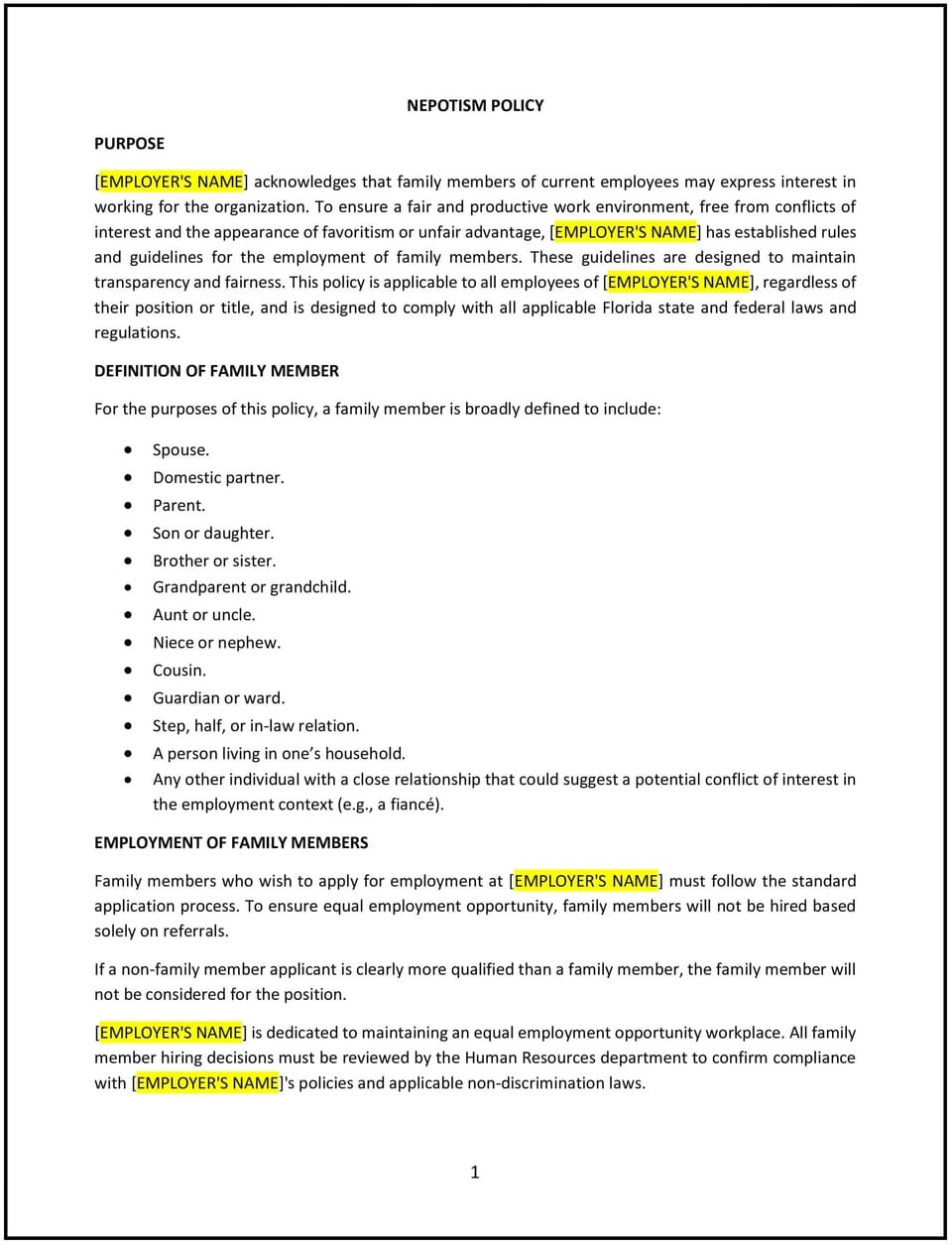Nepotism policy (Florida): Free template

Nepotism policy (Florida)
A nepotism policy helps Florida businesses establish guidelines for managing relationships between employees and their relatives to ensure fair and unbiased hiring and promotion practices. This policy outlines procedures for disclosing familial relationships, addressing conflicts of interest, and maintaining operational integrity. It is designed to promote fairness, reduce risks, and provide clear expectations for managing nepotism in the workplace.
By implementing this policy, businesses in Florida can demonstrate their commitment to ethical practices, enhance operational efficiency, and align with the state’s focus on fostering a professional and equitable workplace.
How to use this nepotism policy (Florida)
- Define familial relationships: Clearly specify what constitutes a familial relationship, such as spouses, parents, children, siblings, or other close relatives.
- Establish disclosure requirements: Outline how employees should disclose familial relationships to the business, including whom to contact and how to document disclosures.
- Address conflict of interest: Explain how businesses should handle conflicts of interest arising from familial relationships, including hiring, promotions, and supervision.
- Specify approval processes: Outline how businesses should review and approve hiring or promotional decisions involving familial relationships, ensuring fairness and transparency.
- Communicate the policy: Share the policy with employees during onboarding and through regular communications to ensure awareness and understanding.
- Monitor adherence: Regularly review how the policy is applied and address any concerns or discrepancies promptly.
- Update the policy: Periodically assess the policy to reflect changes in workplace dynamics, legal standards, or business needs.
Benefits of using this nepotism policy (Florida)
This policy offers several advantages for Florida businesses:
- Promotes fairness: Clear guidelines help ensure that hiring and promotion decisions are made based on merit rather than personal connections.
- Reduces risks: Defined procedures minimize the likelihood of conflicts of interest, biased decision-making, or reputational damage.
- Builds trust: Demonstrates the business’s commitment to ethical practices and employee well-being.
- Aligns with community values: Reflects Florida’s emphasis on professionalism, fairness, and mutual respect in the workplace.
- Enhances reputation: A robust policy showcases the business’s dedication to ethical practices and operational integrity.
- Improves decision-making: Helps businesses anticipate potential conflicts and incorporate safeguards into hiring and promotion practices.
- Supports growth: A strong framework for managing nepotism fosters a culture of accountability and adaptability.
Tips for using this nepotism policy (Florida)
- Communicate clearly: Ensure employees understand the policy by providing written materials and discussing it during meetings or training sessions.
- Train managers: Educate supervisors on how to handle nepotism disclosures and conflicts of interest fairly and consistently.
- Be transparent: Require employees to disclose all familial relationships to ensure transparency and avoid conflicts of interest.
- Stay informed: Keep up with changes in employment laws, regulations, or best practices that may affect nepotism policies.
- Encourage feedback: Solicit input from employees to identify areas for improvement and ensure the policy meets their needs.
- Review periodically: Assess the policy’s effectiveness and make updates as needed to reflect changes in workplace dynamics or business goals.
Q: Why should Florida businesses adopt a nepotism policy?
A: Businesses should adopt this policy to promote fairness, reduce risks, and demonstrate their commitment to ethical practices regarding familial relationships in the workplace.
Q: What types of relationships should be considered nepotism?
A: Businesses should consider relationships such as spouses, parents, children, siblings, or other close relatives as potential sources of nepotism.
Q: How should businesses handle nepotism disclosures?
A: Businesses should require employees to disclose all familial relationships and review these disclosures to ensure fairness and transparency in hiring and promotion practices.
Q: Should businesses restrict hiring or promotions involving relatives?
A: Businesses should restrict hiring or promotions involving relatives in the same department or under direct supervision to avoid conflicts of interest and ensure fairness.
Q: How can businesses ensure fairness in managing nepotism?
A: Businesses should apply the policy consistently across all employees, ensuring that decisions are based on objective criteria and documented evidence.
Q: Should businesses provide training on nepotism?
A: Businesses should provide training to managers and staff on recognizing nepotism, understanding the policy, and following procedures.
Q: How often should businesses review the policy?
A: Businesses should review the policy annually or whenever there are significant changes in workplace dynamics, legal standards, or business operations.
This article contains general legal information and does not contain legal advice. Cobrief is not a law firm or a substitute for an attorney or law firm. The law is complex and changes often. For legal advice, please ask a lawyer.


